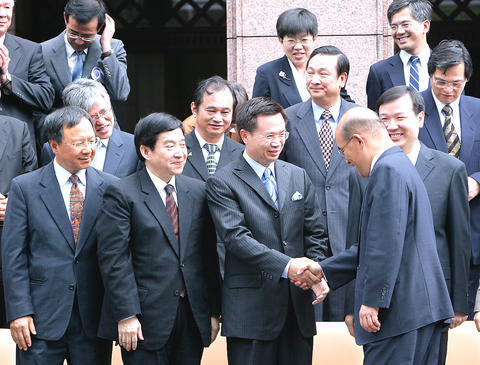Premier Su Tseng-chang (
Su and his Cabinet members took a group photo after presiding over the weekly Executive Yuan meeting earlier yesterday to commemorate the last day of his nearly 16-month tenure.
Su said that although he had met with numerous political challenges during the past 16 months, the help he received from the Cabinet enabled him to deal with the problems.

PHOTO: CNA
"I would not say we did a perfect job, but we definitely did something remarkable," he said.
"The unemployment rate dropped to 3.9 percent. The TAIEX reached 8,000 points," he said. "I think we managed to do something meaningful."
Su also talked about his "Big Warmth" plan. The plan is set to be implemented over a three-year period, and forms the first stage of the government's Economic Development Vision 2015 strategy. The total cost of the project is estimated at NT$1.17 trillion (US$35 million).
"Some of you might be leaving, while some of you may stay. But no matter what, I do hope that our policies can be continued, especially projects like the `Big Warmth' plan," Su said.
The stalled annual government budget proposal had also been a headache for Su.
"It has been my biggest frustration so far. I am leaving office, but I am not abandoning my people. I hope the budget issue can be resolved as soon as possible, so that the government can continue to work for the people," he said.
The Presidential Office yesterday confirmed that Chang had paid a visit to Presidential Office Secretary-General Chiou I-jen (邱義仁) in the morning, but declined to say whether they had discussed the new Cabinet line-up.
Yesterday morning Chang was tight-lipped about the Cabinet reshuffle, saying he would announce the new line-up when things are more settled. Late last night, however, Chang's office issued a statement stating that he had appointed Chiou as vice premier.
The statement said that Chen Chin-Jun (
Minister of Finance Ho Chih-chin (
Keeping the economic and financial team intact reflects the government's decision to maintain policy continuity and market stability, analysts said.
Chen Jin-jun was a three-term DPP legislator before he assumed the post of vice minister of transportation and communications last month.
Lu is a DPP legislator-at-large working on behalf of the underprivileged on the basis of his extended experience with labor unions.
Lu said that he would maintain the government's policy of increasing the minimum monthly wage.
"Premier Su Tseng-chang had said that the minimum wage proposal would be implemented in July. It won't be necessary to change the policy," he said.
He said the proposal had been agreed upon by labor representatives, employers and the government, and that the government should therefore live up to it.
The Central News Agency reported earlier yesterday that the country's representative to Germany, Shieh Jhy-wey (謝志偉) would take the helm of the Government Information Office.
Additional reporting by Shih Hsiu-chuan and CNA

DAREDEVIL: Honnold said it had always been a dream of his to climb Taipei 101, while a Netflix producer said the skyscraper was ‘a real icon of this country’ US climber Alex Honnold yesterday took on Taiwan’s tallest building, becoming the first person to scale Taipei 101 without a rope, harness or safety net. Hundreds of spectators gathered at the base of the 101-story skyscraper to watch Honnold, 40, embark on his daredevil feat, which was also broadcast live on Netflix. Dressed in a red T-shirt and yellow custom-made climbing shoes, Honnold swiftly moved up the southeast face of the glass and steel building. At one point, he stepped onto a platform midway up to wave down at fans and onlookers who were taking photos. People watching from inside

A Vietnamese migrant worker yesterday won NT$12 million (US$379,627) on a Lunar New Year scratch card in Kaohsiung as part of Taiwan Lottery Co’s (台灣彩券) “NT$12 Million Grand Fortune” (1200萬大吉利) game. The man was the first top-prize winner of the new game launched on Jan. 6 to mark the Lunar New Year. Three Vietnamese migrant workers visited a Taiwan Lottery shop on Xinyue Street in Kaohsiung’s Gangshan District (崗山), a store representative said. The player bought multiple tickets and, after winning nothing, held the final lottery ticket in one hand and rubbed the store’s statue of the Maitreya Buddha’s belly with the other,

Japan’s strategic alliance with the US would collapse if Tokyo were to turn away from a conflict in Taiwan, Japanese Prime Minister Sanae Takaichi said yesterday, but distanced herself from previous comments that suggested a possible military response in such an event. Takaichi expressed her latest views on a nationally broadcast TV program late on Monday, where an opposition party leader criticized her for igniting tensions with China with the earlier remarks. Ties between Japan and China have sunk to the worst level in years after Takaichi said in November that a hypothetical Chinese attack on Taiwan could bring about a Japanese

‘COMMITTED TO DETERRENCE’: Washington would stand by its allies, but it can only help as much as countries help themselves, Raymond Greene said The US is committed to deterrence in the first island chain, but it should not bear the burden alone, as “freedom is not free,” American Institute in Taiwan Director Raymond Greene said in a speech at the Institute for National Defense and Security Research’s “Strengthening Resilience: Defense as the Engine of Development” seminar in Taipei yesterday. In the speech, titled “Investing Together and a Secure and Prosperous Future,” Greene highlighted the contributions of US President Donald Trump’s administration to Taiwan’s defense efforts, including the establishment of supply chains for drones and autonomous systems, offers of security assistance and the expansion of